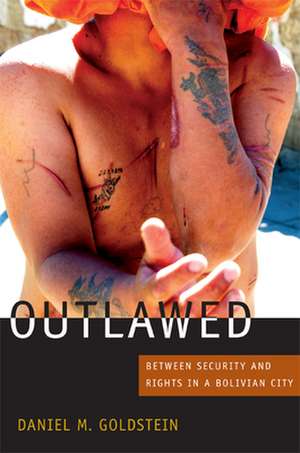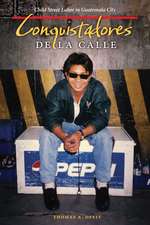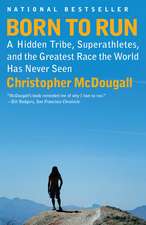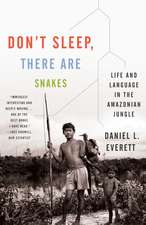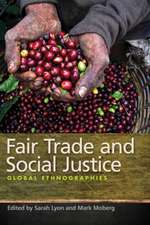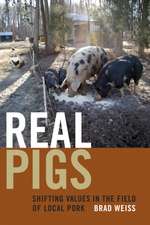Outlawed – Between Security and Rights in a Bolivian City: The Cultures and Practice of Violence
Autor Daniel M. Goldsteinen Limba Engleză Paperback – 20 aug 2012
Preț: 266.18 lei
Nou
Puncte Express: 399
Preț estimativ în valută:
50.94€ • 53.04$ • 43.05£
50.94€ • 53.04$ • 43.05£
Carte tipărită la comandă
Livrare economică 08-22 martie
Preluare comenzi: 021 569.72.76
Specificații
ISBN-13: 9780822353119
ISBN-10: 0822353113
Pagini: 344
Ilustrații: 9 photographs, 1 map
Dimensiuni: 161 x 236 x 23 mm
Greutate: 0.5 kg
Editura: MD – Duke University Press
Seria The Cultures and Practice of Violence
ISBN-10: 0822353113
Pagini: 344
Ilustrații: 9 photographs, 1 map
Dimensiuni: 161 x 236 x 23 mm
Greutate: 0.5 kg
Editura: MD – Duke University Press
Seria The Cultures and Practice of Violence
Recenzii
"In Outlawed, Daniel M. Goldstein tackles one of the most critical issues confronting Latin America today, namely, the insecurity experienced by numerous citizens who fear falling victim to theft, robbery, burglary, assault, rape, or homicide as they go about their daily lives. He proceeds in a smart way, by examining the Bolivian state's representations of violence, Bolivian citizens' experiences in a local neighborhood, and the notions of community justice and illegitimate violence that circulate locally, nationally, and internationally." Susan Bibler Coutin, author of Nations of Emigrants: Shifting Boundaries of Citizenship in El Salvador and the United States"This is a terrific work, lively and engaging. It adds to the anthropological understanding of the law in practice in several ways. First, the book demonstrates that while the state does not protect those in Cochabamba's poor urban settlements from crime, it is present in their lives as a set of onerous bureaucratic and legal requirements. Second, it challenges legal pluralist arguments that there is an entirely separate legality operating in city slums. It reveals the legal systems of the urban poor not as entirely separate from the state but as fractured conjunctures of state and other legalities. Third, the book emphasizes the creative waysfrom vigilantism to selective reliance on state services and local leadersthat marginalized communities handle legal problems. Taken together, its arguments are a major contribution to the field." Sally Engle Merry, author of Gender Violence: A Cultural Perspective
"In Outlawed, Daniel M. Goldstein tackles one of the most critical issues confronting Latin America today, namely, the insecurity experienced by numerous citizens who fear falling victim to theft, robbery, burglary, assault, rape, or homicide as they go about their daily lives. He proceeds in a smart way, by examining the Bolivian state's representations of violence, Bolivian citizens' experiences in a local neighborhood, and the notions of community justice and illegitimate violence that circulate locally, nationally, and internationally." Susan Bibler Coutin, author of Nations of Emigrants: Shifting Boundaries of Citizenship in El Salvador and the United States "This is a terrific work, lively and engaging. It adds to the anthropological understanding of the law in practice in several ways. First, the book demonstrates that while the state does not protect those in Cochabamba's poor urban settlements from crime, it is present in their lives as a set of onerous bureaucratic and legal requirements. Second, it challenges legal pluralist arguments that there is an entirely separate legality operating in city slums. It reveals the legal systems of the urban poor not as entirely separate from the state but as fractured conjunctures of state and other legalities. Third, the book emphasizes the creative ways - from vigilantism to selective reliance on state services and local leaders - that marginalized communities handle legal problems. Taken together, its arguments are a major contribution to the field." Sally Engle Merry, author of Gender Violence: A Cultural Perspective
"In Outlawed, Daniel M. Goldstein tackles one of the most critical issues confronting Latin America today, namely, the insecurity experienced by numerous citizens who fear falling victim to theft, robbery, burglary, assault, rape, or homicide as they go about their daily lives. He proceeds in a smart way, by examining the Bolivian state's representations of violence, Bolivian citizens' experiences in a local neighborhood, and the notions of community justice and illegitimate violence that circulate locally, nationally, and internationally." Susan Bibler Coutin, author of Nations of Emigrants: Shifting Boundaries of Citizenship in El Salvador and the United States "This is a terrific work, lively and engaging. It adds to the anthropological understanding of the law in practice in several ways. First, the book demonstrates that while the state does not protect those in Cochabamba's poor urban settlements from crime, it is present in their lives as a set of onerous bureaucratic and legal requirements. Second, it challenges legal pluralist arguments that there is an entirely separate legality operating in city slums. It reveals the legal systems of the urban poor not as entirely separate from the state but as fractured conjunctures of state and other legalities. Third, the book emphasizes the creative ways - from vigilantism to selective reliance on state services and local leaders - that marginalized communities handle legal problems. Taken together, its arguments are a major contribution to the field." Sally Engle Merry, author of Gender Violence: A Cultural Perspective
Notă biografică
Cuprins
Descriere
Illuminates the complex interconnections between differing definitions of security and human rights
